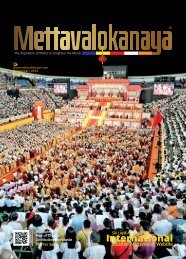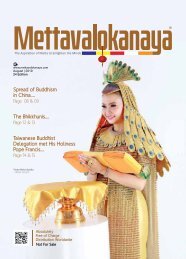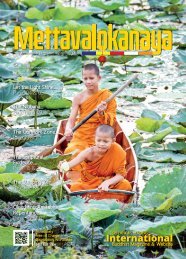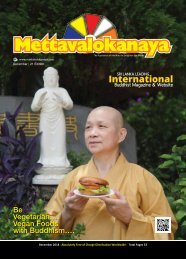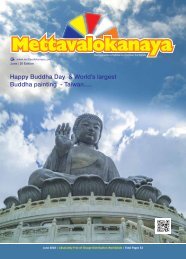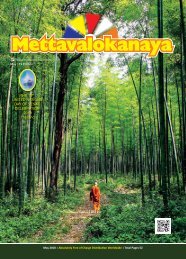Mettavalokanaya_Buddhist_Magazine_March_2019
“Mettavalokanaya” International Monthly Buddhist Magazine has been successfully distributed to 40 countries including all districts across Sri Lanka and now “Mettavalokanaya” is Sri Lankan Most Popular & Leading monthly Buddhist Magazine.
“Mettavalokanaya” International Monthly Buddhist Magazine has been successfully distributed to 40 countries including all districts across Sri Lanka and now “Mettavalokanaya” is Sri Lankan Most Popular & Leading monthly Buddhist Magazine.
You also want an ePaper? Increase the reach of your titles
YUMPU automatically turns print PDFs into web optimized ePapers that Google loves.
Comfort<br />
Zone….<br />
“trying new<br />
things for<br />
better”....<br />
Comfort zone as emotional<br />
boundary - Comfort zone is<br />
the emotional boundary that<br />
we set so that we would not<br />
feel insecure and threatened. It was in<br />
February 1999 that I happened to talk<br />
about in at Los Angeles Mission College<br />
where I conducted a mindfulness<br />
meditation session. Almost everyone<br />
asked me questions about it. Ever since<br />
it is a term that I hear and use on daily<br />
basis. I as a guidance counselor noticed<br />
that comfort zone is more often used in<br />
the West. However, during a recent visit<br />
to Sri Lanka I heard people often mention<br />
it. People talk about their comfort zone<br />
more than ever before. The situation is<br />
due the fact that the world nowadays<br />
is a global village fed by social media<br />
and bleeding-edge technology that<br />
emotionally suffocate people instead<br />
of comforting them. However, we<br />
cannot put the blame on social media<br />
and technology. We must choose our<br />
needs wisely. Let us first look at the Pali<br />
canonical reference to comfort zone.<br />
Pettika-visaya, the Pali term - We<br />
come across a Pali term, ‘pettika-visaya,’<br />
in the Sakunagghi Sutra of the Samyutta<br />
Nikāya. First let us see the story behind<br />
pettika-visaya prior to defining it. The<br />
story is about a hawk and a quail. Once a<br />
quail who had been advised by its mother<br />
to never wander out of its proper range<br />
and into a territory of other, went against<br />
its mother’s advice and flew out of its<br />
range. Suddenly, a hawk swooped down<br />
on the quail and caught it. Being carried<br />
off to death, the quail begged hawk<br />
for life. The quail lamented its unwise<br />
decision and thought that it should not<br />
have its own ancestral territory. However,<br />
the story ends with the quail being freed<br />
by the hawk. The quail learned an ample<br />
lesson of its comfort zone. Not everyone<br />
is lucky. In most cases there is no U-turn.<br />
Comfort zone as ancestral milieu<br />
- Ancestral milieu is our genetic, cultural<br />
and social environment that we we were<br />
born into and acquired our upbringing<br />
from. Parents and or family is the nucleus<br />
of comfort zone. While we are free to<br />
assimilate with and expand our comfort<br />
zones, we need to educate ourselves<br />
that the nucleus of our comfort zone can<br />
never be outside of our ancestral milieu.<br />
In my counseling sessions I have come<br />
across people traumatized with what is<br />
called identity crisis. Such crisis is due<br />
to a dormant urge in our psyche that<br />
we find solace in our ancestral milieu.<br />
The quail eventually remembered the<br />
advice its mother gave him. In a recent<br />
research I did on Facebook, 98 per<br />
cent of Facebook users traumatized by<br />
relationship breakups wrote kudos to<br />
their mother of either parent who would<br />
accept their children back to the family<br />
no matter what. In case<br />
Fetal position (gabbha-seyyā) - It<br />
is typical of those who lost their comfort<br />
zone to lie in fetal position. Most of<br />
them that I spoke with claimed they<br />
woke up in the middle of the night and<br />
found themselves lying in fetal position.<br />
That is their biological indication that<br />
they either feel like going back into<br />
the mother’s womb or subconsciously<br />
calling their mothers for help. Fetal<br />
position is a psycho-biological indication.<br />
By accurately interpreting it, the kind<br />
of remedy can be determined before it<br />
is too late. In certain cases, they dream<br />
of their parents coming to their rescue,<br />
even if the parents are no more. Mostly,<br />
it is not a supernatural dream but an<br />
anxiety dream.<br />
Choices made mindfully - Despite<br />
our talents, strengths and experience,<br />
one can easily be prey to hawk-like<br />
others. In general, people are not<br />
aware of risks associated with their<br />
choices deemed necessary to expand<br />
their comfort zone. Mindfulness needs<br />
to be used in trying new things so that<br />
damage can be avoided or minimized.<br />
Oftentimes, people are not happy<br />
with the outcome of their choices and<br />
complain that they should not have<br />
made those choices. Choosing mindfully<br />
is a difficult task since we have a builtin<br />
tendency of only looking at the<br />
comfort anticipated therein but not the<br />
consequences thereafter. People need to<br />
pre-educate themselves in a universally<br />
psychological pattern of fallback that the<br />
Buddha has taught. The pattern is called<br />
adhesion (anuruddha) and aversion<br />
(pativiruddha). In adhering there is an<br />
almost inevitable chance of aversion.<br />
It is mindfully made choices that bring<br />
us joy from our adhesion. Otherwise,<br />
consequences are clearly inevitable.<br />
Two types of comfort zone - To<br />
some their comfort zone needs to be<br />
expanded by trying new things. To some<br />
their comfort zone need not be expanded.<br />
Based these two tendencies there are<br />
two types of comfort zones, introspective<br />
and extrospective. Introspective people<br />
feel that their comfort zone need not be<br />
expanded however narrow it is, while<br />
extrospective people feel that expansion<br />
of it essential. In both case there is a risk.<br />
The Type One people must make sure<br />
that they never be like quails flying freely<br />
but being blind to dangers. In other<br />
words, freedom of choice must follow<br />
accepted ethical and legal boundaries of<br />
the society or country we live. The Type<br />
Two people must make sure that they<br />
do not marginalize themselves. In other<br />
words, must be mindful enough to never<br />
lock themselves up in an emotional dark<br />
room.<br />
Self-mettā as a remedy - As<br />
recommended by the Buddha we need<br />
at least one trustworthy friend (kalyānamitta),<br />
who is capable of understanding<br />
our emotions. In case such a friend<br />
is unavailable we would rather live<br />
in solitude but practicing self-mettā<br />
(unconditional love towards oneself).<br />
Such life in solitude is called the lifestyle<br />
of a rhino in the Khaggavisāna Sutra<br />
(discourse on the rhinoceros behaviour.<br />
Self-mettā helps avoid codependency<br />
that is a mental tendency of relying on<br />
others especially on those we have lost<br />
connection with. Relationship breakup<br />
and divorce often lead to codependency.<br />
In self-mettā we trust ourselves and<br />
move on as opposed to imprisoning<br />
ourselves in an emotional prison. In case<br />
the comfort zone is already lost, it can be<br />
reset with the assistance of a kalyānamitta<br />
and self-metta. Complaints against<br />
oneself or those who victimized one<br />
only further drains one’s energy. Leave<br />
complaints behind and move on.<br />
USA<br />
The Chief Sanghanayake of<br />
North America at Asgiriya<br />
Chapter, Chief Incumbent<br />
of Life Coach, Mindfulness<br />
Instructor, USA<br />
Most Venerable<br />
Dedunupitiye Upananda<br />
Thero<br />
36 l <strong>Mettavalokanaya</strong> l <strong>March</strong> l <strong>2019</strong> l www.mettavalokanaya.com www.mettavalokanaya.com l <strong>2019</strong> l <strong>March</strong> l <strong>Mettavalokanaya</strong> l 37











